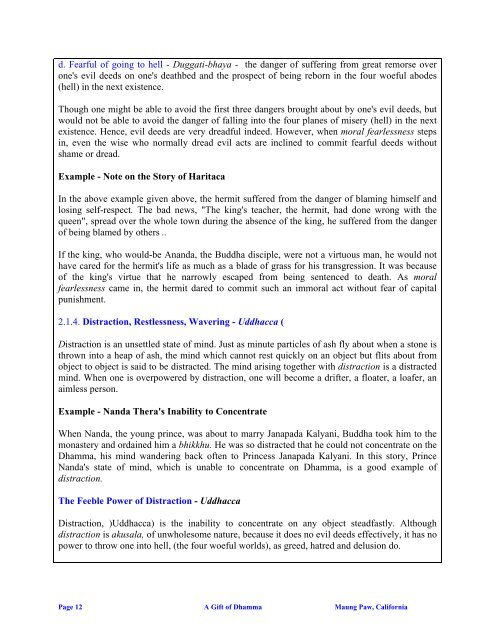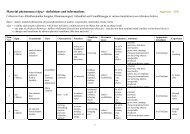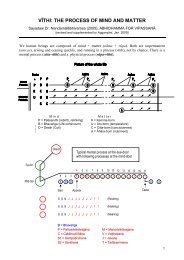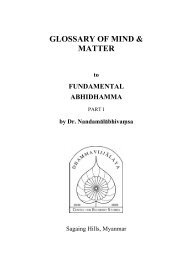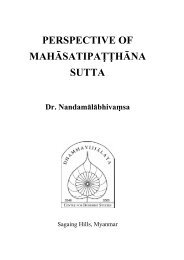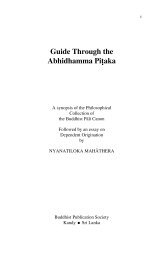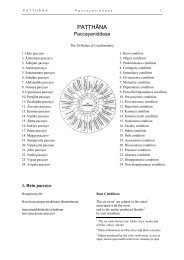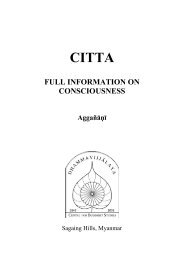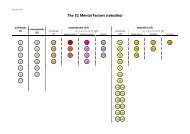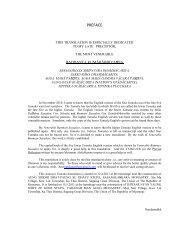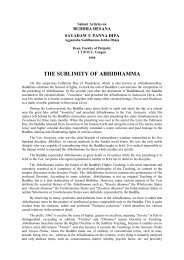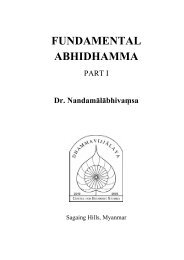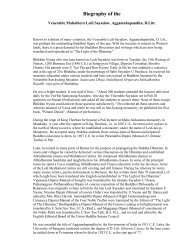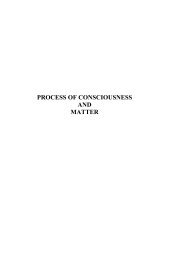ABHIDHAMMA IN DAILY LIFE - Abhidhamma.com
ABHIDHAMMA IN DAILY LIFE - Abhidhamma.com
ABHIDHAMMA IN DAILY LIFE - Abhidhamma.com
You also want an ePaper? Increase the reach of your titles
YUMPU automatically turns print PDFs into web optimized ePapers that Google loves.
d. Fearful of going to hell - Duggati-bhaya - the danger of suffering from great remorse over<br />
one's evil deeds on one's deathbed and the prospect of being reborn in the four woeful abodes<br />
(hell) in the next existence.<br />
Though one might be able to avoid the first three dangers brought about by one's evil deeds, but<br />
would not be able to avoid the danger of falling into the four planes of misery (hell) in the next<br />
existence. Hence, evil deeds are very dreadful indeed. However, when moral fearlessness steps<br />
in, even the wise who normally dread evil acts are inclined to <strong>com</strong>mit fearful deeds without<br />
shame or dread.<br />
Example - Note on the Story of Haritaca<br />
In the above example given above, the hermit suffered from the danger of blaming himself and<br />
losing self-respect. The bad news, "The king's teacher, the hermit, had done wrong with the<br />
queen", spread over the whole town during the absence of the king, he suffered from the danger<br />
of being blamed by others ..<br />
If the king, who would-be Ananda, the Buddha disciple, were not a virtuous man, he would not<br />
have cared for the hermit's life as much as a blade of grass for his transgression. It was because<br />
of the king's virtue that he narrowly escaped from being sentenced to death. As moral<br />
fearlessness came in, the hermit dared to <strong>com</strong>mit such an immoral act without fear of capital<br />
punishment.<br />
2.1.4. Distraction, Restlessness, Wavering - Uddhacca (<br />
Distraction is an unsettled state of mind. Just as minute particles of ash fly about when a stone is<br />
thrown into a heap of ash, the mind which cannot rest quickly on an object but flits about from<br />
object to object is said to be distracted. The mind arising together with distraction is a distracted<br />
mind. When one is overpowered by distraction, one will be<strong>com</strong>e a drifter, a floater, a loafer, an<br />
aimless person.<br />
Example - Nanda Thera's Inability to Concentrate<br />
When Nanda, the young prince, was about to marry Janapada Kalyani, Buddha took him to the<br />
monastery and ordained him a bhikkhu. He was so distracted that he could not concentrate on the<br />
Dhamma, his mind wandering back often to Princess Janapada Kalyani. In this story, Prince<br />
Nanda's state of mind, which is unable to concentrate on Dhamma, is a good example of<br />
distraction.<br />
The Feeble Power of Distraction - Uddhacca<br />
Distraction, )Uddhacca) is the inability to concentrate on any object steadfastly. Although<br />
distraction is akusala, of unwholesome nature, because it does no evil deeds effectively, it has no<br />
power to throw one into hell, (the four woeful worlds), as greed, hatred and delusion do.<br />
Page 12 A Gift of Dhamma Maung Paw, California


